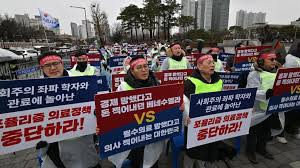South Korea urges return to work amid ongoing medical protests

In South Korea, the government issued a stern call on Monday for trainee doctors to resume their duties within the next three days, cautioning that failure to do so could lead to legal repercussions, as protests against medical reforms stretched into their second week.
According to official statistics, over 10,000 junior doctors, constituting 80.5 percent of the trainee workforce, have tendered their resignations as part of an escalating movement opposing government proposals to significantly expand medical school admissions. This move comes amidst concerns over shortages in the healthcare sector compounded by an aging population.
The widespread work stoppage has had severe consequences, with reports of surgeries for cancer patients and C-sections being postponed or cancelled. In response, the government has elevated the public health alert to its highest level.
In South Korea, doctors are classified as essential workers and are legally prohibited from striking. Despite this, the government has labeled the mass resignation as unlawful. As of Monday, 9,006 trainee doctors had failed to report to work, prompting warnings of impending legal actions, including prosecution and the suspension of medical licenses.
Second Vice Health Minister Park Min-soo, in a press briefing, implored the protesting doctors to return to their posts by the end of February, emphasizing that they would not be held accountable for their past actions if they comply.
Those who persist in their absence face suspension of their medical licenses for a minimum of three months, a penalty that could adversely impact their future career prospects, including opportunities for overseas employment.
The ongoing shortage of medical professionals has placed a strain on hospitals nationwide, prompting additional doctors, including fellows and recent graduates, to join the protests. South Korea contends with one of the lowest doctor-to-population ratios among developed nations and seeks to address this by admitting 2,000 more students to medical schools annually, commencing next year.
While proponents argue that increased admissions will improve accessibility to healthcare, opponents, particularly junior doctors, assert that it will compromise service quality. Public sentiment appears divided, with polls indicating substantial support for the expansion in medical school admissions, especially among those in remote areas lacking adequate healthcare access.
In the face of escalating tensions, calls for dialogue and resolution through peaceful means have emerged. The Chosun Ilbo newspaper underscored the urgency of addressing the shortage of medical professionals while cautioning against jeopardizing patient care. It urged doctors to halt collective action and engage in constructive dialogue to find a viable solution to the ongoing crisis.












